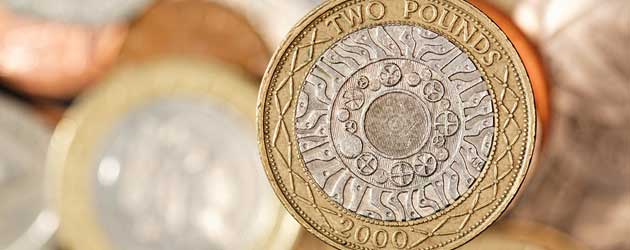
The Pound to Euro exchange rate (GBP/EUR) grew by around half a cent, reaching a daily high of 1.1715 earlier this morning, as investors got to grips with the implications of Fitch’s decision to join Moody’s in stripping Britain of its coveted AAA credit rating.
When Fitch announced that it had cut the UK sovereign rating one notch to AA+, Sterling immediately came under selling pressure as panic-stricken traders reacted to the news. However, the Pound to Euro exchange rate (GBP/EUR) bounced higher on Monday morning when markets re-opened for the week, as it became apparent that Fitch’s decision was to have little bearing on the UK government’s ability to borrow money at low interest rates.
Because Britain has its own Central Bank – the Bank of England – with the ability to print its own money, there is very little chance of the UK government ever defaulting on its debt. Also working in the Treasury’s favour is the fact that large portions of UK government bills have maturity dates in the distant future; meaning that Britain has many years to earn the money needed to pay off its debt.
Over in Italy, politicians finally managed to elect a President. With the first three rounds of voting failing to find a clear-cut winner, the fourth round – where the margin for victory is relaxed – led to the re-election of former President Giorgio Napolitano. When Napolitano was sworn in, tear-stricken, he threatened to resign unless the dysfunctional Italian political model is swiftly reformed.
Financial markets reacted with optimism to the election result because it appears to open the door for a grand coalition between the centre-left Democratic Party and Silvio Berlusconi’s centre-right People of Freedom Party. Italy has remained ungoverned since general elections took place in February, during which time important economic reforms have remained on the sidelines, stalling Italy’s fiscal consolidation efforts. With a new government set to be formed, investors regained confidence in the Eurozone’s third largest economy. Italian 10-year bond yields declined by -16 basis points to 4.06%.
Italian trader Edoardo Liuni said:
“International investors welcomed the re-election of President Napolitano and with that, the untangling of this political deadlock that Italy has been trapped in for several weeks”.
The decision to re-appoint Napolitano did not come without controversy: Democratic Party leader Pier Luigi Bersani announced his resignation over the weekend because neither of his two choices for President gained enough votes, and Five Star Movement leader Beppe Grillo described the Presidential vote as “a cunning little institutional coup” designed to keep the old parties in power.
The Euro exchange rate could be set to fall further if this morning’s Eurozone PMI reports show “further economic deterioration” according to Bundesbank President and ECB Board Member Jens Weidmann. The German Central Banker’s comments indicated that a weak set of PMI’s for April could influence the ECB to introduce an interest rate cut from 0.75% to 0.50%. The Composite figure for the 17-nation bloc is projected to print at an uninspiring 46.5 – will this be enough to prompt a rate cut? Difficult to tell. But one thing’s for sure: a significantly weaker-than-expected PMI score will spook markets and allow Sterling (GBP/EUR) to rally against the single currency.

Comments are closed.